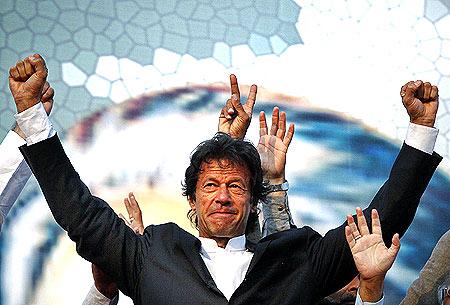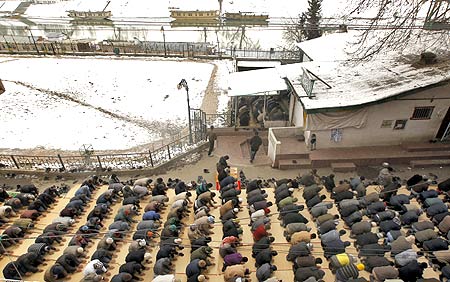
If American businessman Mansoor Ijaz's revelations about a secret memo allegedly issued by President Asif Ali Zardari's government last year, seeking American help to avert a likely coup in Pakistan, has brought relations between its army and the civilian administration to a crisis point, his past exploits in India on Kashmir has left the Indian government sour-faced as well.
A S Dulat, former chief of the Research and Analysis Wing, India's external intelligence agency, worked on then prime minister Atal Bihari Vajpayee's Kashmir policy along with then national security adviser Brajesh Mishra.
In an exclusive interview to Rediff.com's Sheela Bhatt, Dulat maintains that no one in the Indian government ever invited Ijaz to engage on the Kashmir issue and analyses the impending end of Pakistan President Asif Ali Zardari's honeymoon with the army which has paved the way for Imran Khan's sudden rise as a new factor in Pakistan politics.
Part I of the interview, which is making waves in Pakistan: 'Mansoor Ijaz was working for the ISI'
Did Husain Haqqani, the then Pakistan ambassador to the US, make the mistake of dictating the message through Blackberry?
I don't know whether he dictated it or didn't. It's only one person's word against another.
What Haqqani has been telling the Pakistan government is that you can take all my phones, all my devices, and check the record, I'm not in this at all.
So possibly, Mansoor Ijaz must have been kept in the loop.
The other interesting part of this issue is that we should know that when a coup happens at all in Pakistan it happens at the most unexpected time.
In 2011 there has never been any indication either before the death of Osama bin Laden or after.
More so, after the death of Osama, the Pakistan army has been so defensive that there was no chance of a coup.
Whenever you talk about the military in Pakistan or more specifically about (Pakistan army chief) General Kayani, the response is that he is not interested in taking over, he's not (then Pakistan president and army chief General Pervez) Musharraf.
He wants the military should remain supreme, as it always has been in Pakistan, and that it should have control over foreign policy.
But he still wants a civilian government as a front and Asif Ali Zardari suited everybody.
President Zardari was the most convenient person for everybody and also for the army because the army could not have been as comfortable as they have been with Zardari.
Now it seems that the honeymoon is beginning to end and suddenly Imran Khan has become a new factor in Pakistan.
He (Imran Khan) talks about a tsunami, about a wave in Pakistan, and has been telling all the television channels that 'You can bet on me, I will not only win next time, I will win hands down.'
Whether he wins or doesn't win, one thing is for sure: Imran Khan is making an impact, especially with the youth in Pakistan.
The most significant thing about his jalsa (rally) was that it was held in Lahore, in the heart of Nawaz Sharif country.
It was a huge rally. Whether he can translate it into votes and whether he can win an election, time will tell. But it would be worrying people in Pakistan, the kind of impact he is beginning to have.
In Pakistan there is a feeling that Imran Khan is very rigid. He may not be the best choice for prime minister.
Don't miss Mansoor Ijaz's exclusive interview to Rediff.com in November 2000
Please ...

Do you think Imran Khan is covertly supported by the army?
It's very difficult to say. But the general impression is that the army would be quite happy with Imran.
Although Imran himself has said that he will make sure, as every Pakistani politician has to say, that he will keep the army under his control.
He has said a few things about Kashmir. Will his rise worry India?
Not at all. He's saying all the right things. I don't know how much of a politician he is and that will be tested in days to come, but there is a consistency about him.
What he is saying is that foreigners should leave Afghanistan, foreigners should leave Pakistan. We don't want interference. We can sort out our problems ourselves.
He is also talking about a reduction in the military's role. He is saying the same thing for the Indian army in Kashmir. Then a couple of days later he also said 'We, India and Pakistan, need to move together and move forward.' He said that 'We should put Kashmir on the backburner, if we can move forward on other things,' and talked about trade.
Should India worry about the fallout of 'Memogate'?
We should not worry too much just now. Unless this whole thing continues and causes more problems for the civil-military relationship in Pakistan.
People here will be watching it very closely because it would impact the new efforts at reviving the peace process via trade and other ways.
In India there is a substantial lobby which is not very enthusiastic about the peace process. So when something like this happens in Pakistan, it is quite possible that the BJP (Bharatiya Janata Party) or some people will say 'We told you so -- Why are you talking to Pakistan? Who's in charge in Pakistan? Nobody knows what's happening in Pakistan.'
For the next few weeks or so, it will be watched from this side. The positive thing is Sherry Rehman's appointment (as Pakistan's ambassador to the US).
This is a good choice and in a sense whatever the inner story may be, in a sense outwardly, it stabilises the civil-military position.
It is not entirely a military choice for Washington.
Please ...

Coming back to Mansoor Ijaz, you are not being candid on the issue of the Vajpayee government's invitation to Ijaz because you were then part of the prime minister's office.
I am telling you these kind of people are not invited. These are operators. They appear from nowhere and know how to get invited.
So nobody, I can assure you, nobody in the Vajpayee government would have invited him. But here somebody suddenly appears and says 'I can do this for you.'
But I know a person to whom he showed his passport and said I am invited by the Vajpayee government and he said, 'Look at my passport there is no stamp on it.'
I don't know who this magical person is. I don't know. I am telling you what I know.
He was here, he was heard about, he was known, he was flaunting big names, he was saying 'I can help you in Kashmir.'
But don't you think ethically, even diplomatically, it is wrong to involve somebody who says he has a link with America. Why bring America into the Kashmir issue?
You should have looked for a person who had influence in Islamabad, why in Washington?
I am sure he mentioned Islamabad also. I don't know because I have never met him.
What did he do in Kashmir then?
He met Kashmiris. Like how (Ethan Allen Chairman) Farooq Kathwari used to go and meet Kashmiris. I think he met perhaps Yasin Malik and some others.
What was the outcome?
The line he was giving was that he can influence Kashmiris and has a line to high places in the United States and a line to Pakistan. So he can exert influence.
Then, what happened?
Then, he disappeared like all operators disappear! That is what I am saying. Operators just appear and disappear.
Was he just experimenting?
It was not a diplomatic initiative by any stretch of imagination.
What are his views on Kashmir?
I don't know. I never met him. I have no idea. I think for somebody like Ijaz, Kashmir is not important. He's not a Kashmiri. Kashmir is not of any consequence to him.
What is of consequence to him is how he can operate and how can he manipulate. That is what these people are good at.
All I know is that he is supposed to be a businessman. He is also a journalist who writes occasionally. He has some contacts in high places.
Didn't you check whether he actually had contacts in Washington?
I would have checked if I had met him. If I had...there was no occasion, no opportunity.
Kashmir is not of any consequence to him. What is of consequence to him is how he can operate and how can he manipulate. That is what these people are good at.
Don't miss Mansoor Ijaz's exclusive interview to Rediff.com in November 2000